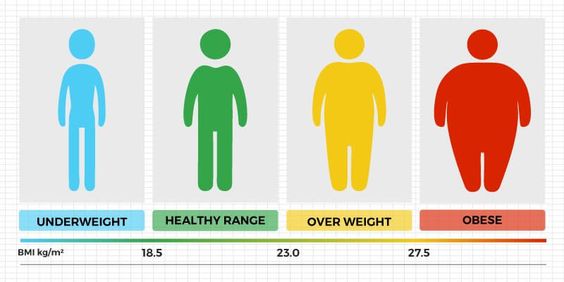Check your BMI (Body Mass Index) using this BMI Calculator below and find out if you are Underweight, Normal weight, Overweight or Obese.
BMI CALCULATOR
*Before using the data obtained using this calculator, please consult with a doctor.
How to Interpret your BMI result
Here's how to interpret the number you got from the above BMI calculator:
BMI Range | Category |
|---|---|
< 16 | Severe Thinness |
6 - 17 | Moderate Thinness |
17 - 18.5 | Mild Thinness |
18.5 - 25 | Normal |
25 - 30 | Overweight |
30 - 35 | Obese Class I |
35 - 40 | Obese Class II |
> 40 | Obese Class III |
According to WHO (World Health Organization) the BMI values and corresponding body weight in the table above is used for both adult men and women (i.e age 18 or older)

Here are more details on each weight category...
Under 18.5 (Underweight)
If you got a result of under 18.5, then your result suggests you're underweight.
Being underweight can be a sign of not eating enough, an eating disorder, or an underlying illness or disease.
And here are some of the risks associated with being underweight:
- A reduction in immune system function
- Nutrient deficiencies & malnutrition
- Impaired growth and development in children and teenagers particularly
- Anaemia (The ability to carry blood vessels is reduced)
- Osteoporosis (a disease that depletes bone strength, putting people at greater risk of breaking bones)
- Can lead to Infertility in women due to hormonal imbalances that can disrupt the menstrual cycle. Also, women that are underweight are at a higher risk of miscarriage in the first trimester
- Potential complications can arise during & after surgery in underweight people
- Generally have a higher death risk compared to people with a healthy BMI
See your doctor immediately, if you feel you or someone you know is underweight for no reason that seems obvious.
18.5 to 25 (Normal Weight)
If you got a result of 18.5 to 25, then your result suggests you're a healthy weight.
That generally means you're in good shape. However, you can have a healthy BMI but still have too much fat.
That's why it is important to also measure your waist size.
Measuring your waist size is a great way to check if you are not carrying too much fat around your tummy. Too much fat around the stomach can increase your risk of heart disease, type 2 diabetes and stroke.
You can have a healthy BMI and still have excess tummy fat, meaning you're still at risk of developing these conditions.
Regardless of your BMI, weight or height, you should try to lose weight if your waist is:
- 94cm (37ins) or more for men
- 80cm (31.5ins) or more for women
You're at very high risk and should see your doctor ASAP if your waist is:
- 102cm (40ins) or more for men
- 88cm (34ins) or more for women
Read more about the limitation of BMI result further down this page.
25 to 30 (overweight)
If you got a result of 25 to 30, then your result suggests you're overweight.
According to CDC (Centers for Disease Control and Prevention) being overweight increases your risk for various diseases and health conditions, such as the following:
- Type II diabetes
- Higher levels of LDL cholesterol (AKA "bad cholesterol"), lower levels of HDL cholesterol (AKA "good cholesterol"), and high levels of triglycerides
- High blood pressure
- Stroke
- Gallbladder disease
- Coronary heart disease
- Certain cancers (endometrial, breast, colon, kidney, gallbladder, liver)
- Sleep apnea and breathing problems
- Osteoarthritis
- Low quality of life
- Body pains and difficulty with certain physical functions
- Mental illnesses such as clinical depression, anxiety, and others
- Generally have a higher death risk compared to people with a healthy BMI
Check out this detailed weight-loss post for help >> How to Lose Weight in Nigeria Fast! (Easy “No-Nonsense” Guide)
Above 30 (obese)
If you got a result of above 30, then your result suggests you're obese.
People who are obese are considered to be more at risk for various diseases and health conditions, such as the following:
- Type II diabetes
- Higher levels of LDL cholesterol (AKA "bad cholesterol"), lower levels of HDL cholesterol (AKA "good cholesterol"), and high levels of triglycerides
- High blood pressure
- Stroke
- Gallbladder disease
- Coronary heart disease
- Certain cancers (endometrial, breast, colon, kidney, gallbladder, liver)
- Sleep apnea and breathing problems
- Osteoarthritis
- Low quality of life
- Body pains and difficulty with certain physical functions
- Mental illnesses such as clinical depression, anxiety, and others
- Generally have a higher death risk compared to people with a healthy BMI
Check out this detailed weight-loss post for help >> How to Lose Weight in Nigeria Fast! (Easy “No-Nonsense” Guide)
Limitations of the BMI Calculator Result
BMI result is not the perfect measure of your overall health. BMI is not fully accurate because it can only measure excess body weight and not excess body fat.
That means, the BMI result cannot tell the difference between excess fat, muscle or bone.
The adult BMI does not take into account age, gender or muscle mass, which can lead to a significant margin of error. For example...
- Older adults tend to have more body fat than younger adults with the same BMI. so an older adult may fall into the "healthy weight" range even though they may be carrying excess fat.
- Women tend to have more body fat than men for an equivalent BMI. Pregnancy will also affect a woman's BMI result.
- Muscular people and highly trained athletes may have higher BMIs due to large muscle mass. And maybe classed "overweight" or "obese" even though their body fat is low.
Therefore, your true BMI is further influenced by other factors such as your age, sex, ethnicity, muscle mass, activity level and body fat, among others.
How BMI is calculated in nigeria?
The Body mass index (BMI) value is calculated by dividing weight in kilograms by height in meters squared.
BMI Calculator Formula
The formula for the BMI is or Quetelet index: body mass (in kilogram) divided by the square of the body height (in metres). And is universally expressed in units of kg/m2
Below is the BMI equation for both the International System of Units (SI) and the US customary system (USC).
SI, Metric Units:
BMI = Weight (kg) ÷ Height ^2 (m)
USC Units:
BMI = 703 × Weight (lbs) ÷ Height ^2 (in)
BMI Alternative to Check excess body fatness
There are a host of other methods to measure body fatness including
- Skinfold thickness measurements (with callipers),
- Underwater weighing,
- Bioelectrical impedance,
- Dual-energy X-ray Absorptiometry (DXA), and
- Isotope dilution 1,2,3.
Unfortunately, many of these methods are not readily available and are either too complicated, time-consuming, expensive, or require highly trained personnel
Conclusion on BMI Calculator Nigeria
The Body Mass Index (BMI) Calculator takes your weight and height as input to calculate your BMI value. The resulting BMI value is then used to determine your weight status (whether you are Underweight, Normal weight, Overweight or Obese.)
The BMI can sometimes be inaccurate because it only takes into consideration weight and height to determine weight status.
Other factors such as your age, sex, ethnicity, muscle mass, activity level and body fat percentage, among others are also important to determine your weight status and overall health condition.
Besides these limitations, BMI is a relatively straightforward and convenient way of assessing someone's weight.
Share This BMI Calculator
Share this BMI calculator page with your friends and family, using the social share buttons down this page.
Thank you.


